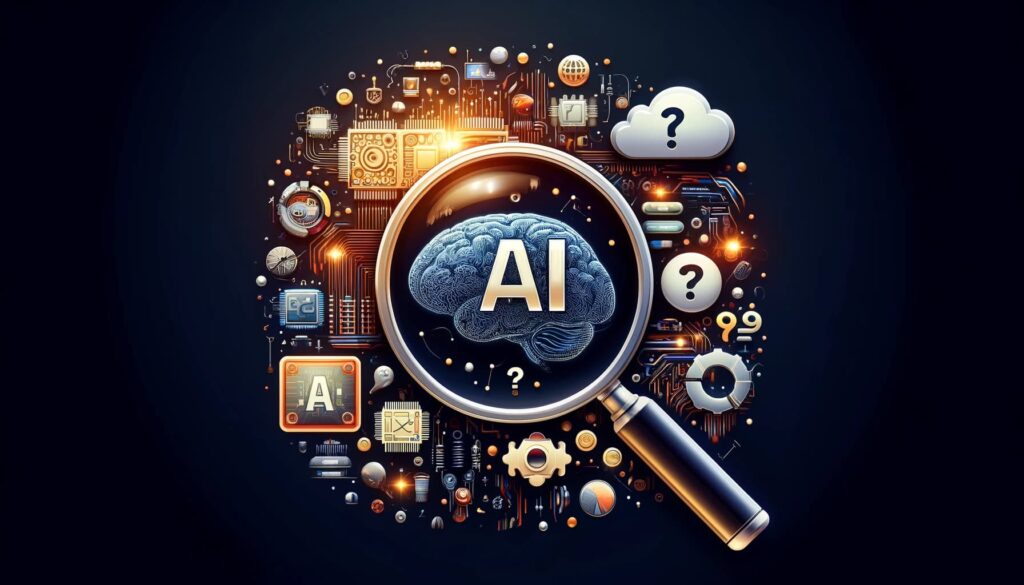Introduction: Unraveling the Myth of AI and SEO

In the ever-evolving landscape of digital marketing, Artificial Intelligence (AI) often finds itself at the center of heated debates—particularly its applicability in Search Engine Optimization (SEO). A prevalent misconception suggests that AI lacks utility in SEO, dismissed by some as incompatible or ineffective. This article aims to dismantle such myths, illuminating the profound impact AI can have on refining SEO strategies. From automating mundane tasks to uncovering hidden insights in vast datasets, AI is not just a tool but a transformative force in the realm of SEO. Join us as we explore how integrating AI-driven techniques can not only streamline processes but also amplify the effectiveness of your SEO efforts, driving significant gains in both visibility and engagement.
Understanding AI’s Role in SEO
Artificial Intelligence (AI) is revolutionizing the field of Search Engine Optimization (SEO) by enhancing how marketers optimize for search engines and engage with content. At its core, AI leverages machine learning and data processing capabilities to automate complex tasks, predict user behavior, and personalize experiences at scale.
One significant way AI impacts SEO is through the improvement of search algorithms themselves. Google’s AI algorithm updates, such as RankBrain, utilize machine learning to better understand the context of search queries, making it easier to match users with more relevant results. Additionally, tools like ChatGPT can assist in generating SEO-friendly content, conducting keyword research, and even suggesting optimizations for better search engine rankings.
The Power of AI-Driven Prompts for SEO
The concept of “MEGA prompts” represents a strategic use of AI in crafting SEO tasks that are more efficient and targeted. These prompts are designed to generate specific, high-impact actions in various areas of SEO, streamlining the process from research to execution.
- SEO Strategy for New E-commerce Websites: Tailor your SEO strategy with AI-driven insights that focus on keyword optimization, user engagement, and competitive analysis specifically crafted for new online stores dealing in handmade crafts or similar niches.
- Local SEO for Family-Owned Restaurants: Utilize AI to analyze local search trends and competitor data to enhance visibility in local search results, focusing on unique selling points like special dishes or historic relevance.
- SEO Content Strategy for Travel Blogs: AI can help identify trending travel topics and optimize content for seasonal keywords, ensuring that the travel blog remains visible and attractive to budget-conscious travelers.
- Technical SEO Audit for Corporate Websites: With AI, perform comprehensive audits more efficiently, identifying issues like slow page load times, poor mobile usability, or improper schema markup, which can hinder SEO performance.
- SEO for Niche Health and Wellness Brands: AI tools can analyze search trends and consumer behavior in the health sector, helping brands craft content that meets the specific needs of their target audience, considering competition and regulatory guidelines.
- Video SEO for Fitness Influencers: AI can suggest optimizations for video titles, descriptions, and tags to improve visibility on platforms like YouTube, catering specifically to fitness enthusiasts searching for workout tips or health advice.
- Multilingual SEO for Global Service Providers: For businesses operating in multiple regions, AI can streamline the creation and management of region-specific content that respects linguistic nuances and cultural differences, ensuring effective reach and engagement across borders.
Step-by-Step Guide to Implementing AI Prompts
Implementing AI-driven prompts effectively can transform your SEO strategy by automating processes and enhancing accuracy. Here’s how you can use these prompts to generate actionable SEO strategies and customize them to fit specific business needs and market niches:
- Identify Your SEO Goals: Before utilizing AI prompts, clearly define what you hope to achieve with your SEO efforts, such as increasing organic traffic, improving keyword rankings, or enhancing user engagement.
- Select Appropriate AI Tools: Choose AI tools that best meet your SEO needs. Tools like ChatGPT for content generation or SEMrush for competitive analysis can be programmed with specific prompts to deliver targeted results.
- Customize AI Prompts: Tailor your AI prompts to address your specific business context and objectives. For instance, if you’re focusing on local SEO for a restaurant, your prompt could be tailored to analyze local competitor SEO strategies and identify high-traffic local keywords.
- Implement and Monitor: Deploy the customized AI prompts within your chosen tools. Monitor the outcomes regularly to ensure that the AI is producing the desired results, and make adjustments to the prompts as needed based on performance data.
- Refine and Repeat: SEO is an ongoing process. Use the insights gained from AI-driven analytics to refine your strategies and prompts continuously, thereby improving the precision and effectiveness of your SEO efforts over time.
Case Studies and Success Stories
Real-world examples and testimonials can powerfully illustrate the effectiveness of AI-driven SEO prompts. Below are some instances where businesses have leveraged AI to achieve remarkable SEO success:
- E-commerce Expansion: An online retailer specializing in eco-friendly products used AI to optimize their site for search engines, resulting in a 50% increase in organic traffic and a 30% increase in sales over six months. The AI system was programmed with prompts to identify emerging eco-friendly trends and optimize content accordingly.
- Local SEO for Restaurants: A family-owned restaurant in Chicago implemented AI-driven prompts to enhance its local SEO strategy. By focusing on local keywords and competitor analysis, they saw a 25% increase in local search rankings and a 40% uptick in reservations from organic search.
- Global SEO Success: A multilingual content provider used AI to manage and optimize SEO across different languages, significantly increasing their global reach. The prompts helped tailor content strategies to cultural nuances and search behaviors in each region, leading to a 70% growth in international traffic.
- Testimonials: “Using AI to streamline our SEO efforts has not only saved us time but has also drastically improved our performance across all major search engines,” says Jane Doe, SEO Manager at Tech Innovations.
These examples and testimonials highlight the practical benefits and real-world impact of integrating AI-driven prompts into SEO strategies, showcasing how they can significantly improve visibility, traffic, and overall business growth.
Overcoming Potential Challenges
Integrating AI into SEO strategies presents unique challenges that, if not addressed, can hinder the effectiveness of your digital marketing efforts. Here are some common issues and practical solutions to ensure your content remains impactful and compliant with search engine guidelines:
- Generic Outputs: AI-generated content can sometimes be too generic or irrelevant, lacking the specificity that users find valuable.
- Solution: Customize AI prompts with specific details about your audience, products, and services. Use AI as a tool for idea generation and initial drafts, but refine outputs with human insights to add uniqueness and relevance.
- Compliance with Google’s Guidelines: AI content must adhere to Google’s quality guidelines, which emphasize originality, relevance, and value to the reader.
- Solution: Regularly update your AI’s training data to align with the latest SEO practices. Ensure all AI-generated content is reviewed and edited by SEO professionals to maintain quality and adherence to ethical SEO practices.
- Over-Optimization: AI tools can sometimes produce content that is overly optimized for SEO, which can lead to penalties from search engines.
- Solution: Balance AI suggestions with user engagement metrics and feedback. Focus on creating user-centric content that naturally incorporates keywords rather than forcing them into the text.
Advanced AI Techniques for SEO Optimization
Advancements in AI technology provide powerful tools for enhancing SEO strategies. Two significant technologies shaping the future of SEO are Deep Learning and Natural Language Processing (NLP):
- Deep Learning and SEO: Deep learning models analyze large sets of data to predict search trends and user behavior, providing SEO strategists with insights that can give them a competitive edge.
- Application: Use deep learning algorithms to identify emerging trends in user searches and predict shifts in consumer interests. This information can guide content creation and optimization, ensuring your SEO strategy remains proactive and aligned with user needs.
- Natural Language Processing (NLP) in Content Creation: NLP techniques help in generating content that not only ranks well on search engines but also genuinely engages users by mimicking human-like language patterns.
- Application: Implement NLP tools to enhance content readability and engagement. These tools can suggest more conversational phrasings, ensure grammatical correctness, and help weave keywords into content naturally, making it more relatable and engaging for the audience.
Integrating AI with Other SEO Tools and Platforms

The synergy between AI and existing SEO tools can amplify the effectiveness of your SEO strategies, providing deeper insights and more refined control over your digital marketing efforts.
- AI and Analytics Tools: AI technologies enhance analytics tools by processing large datasets quickly and with high precision, offering SEO professionals insights that are both actionable and accurate. These insights can include user engagement patterns, bounce rates, and conversion metrics which are crucial for optimizing SEO strategies.
- Implementation: Integrate AI with tools like Google Analytics to automate data analysis, enabling real-time response to emerging trends and anomalies in website traffic or user behavior.
- Combining AI with Traditional SEO Tools: AI can significantly enhance the functionality of traditional SEO tools like SEMrush, Ahrefs, and Moz by automating routine tasks such as keyword research, backlink analysis, and site audits.
- Implementation: Use AI to process the vast amounts of data these tools generate, identifying patterns and opportunities that might be missed manually. For instance, AI can suggest the most valuable keywords to target based on predictive analytics or optimize your backlink strategy by identifying the healthiest and most beneficial links.
Ethical Considerations and Best Practices in AI-Driven SEO
As AI becomes more integral to SEO, it’s crucial to adhere to ethical practices to ensure your strategies do not only perform well but also maintain credibility and fairness.
- Avoiding Black Hat SEO Techniques with AI: The power of AI can be tempting to exploit for quick gains through black hat SEO techniques such as keyword stuffing, cloaking, or using invisible text. However, these practices are against search engine guidelines and can result in severe penalties.
- Best Practices: Always use AI in ways that enhance user experience and provide genuine value. Ensure that AI-driven content adheres to all ethical SEO practices by setting strict guidelines and parameters for AI operations.
- Transparency and AI: Transparency in how AI-driven content is created and used is crucial to maintaining trust with your audience and complying with regulations that demand clear disclosure about AI use.
- Best Practices: Be open about the use of AI in content creation and SEO optimization on your platforms. Inform users when AI has been used to generate content and provide an explanation of what AI tools were employed and how they influence the content they consume.
The Future of AI in SEO
As the digital landscape evolves, the capabilities of AI in SEO are transitioning from reactive methods to more predictive and proactive strategies.
- Predictive SEO: AI is increasingly capable of predictive analytics, which allows businesses to anticipate market trends, consumer behaviors, and search pattern shifts before they fully emerge. This forward-looking approach enables companies to refine their SEO strategies dynamically, staying ahead of industry changes and competitor moves.
- Application: Implement AI-driven tools to analyze historical data and predict future trends, enabling you to adjust content and keywords ahead of major shifts, thereby maintaining or gaining search rankings.
- AI’s Role in Voice Search and Virtual Assistants: As voice search becomes more prevalent, AI is critical in optimizing for this new paradigm. Voice queries often differ significantly from typed requests—they tend to be more conversational and may use longer phrases.
- Application: Use AI to understand and integrate natural language processing techniques that optimize content for voice search, ensuring that your information aligns more closely with how real users speak and ask questions.
Practical Tips for Training Your AI for SEO
To maximize the effectiveness of AI in SEO, it is essential to train and maintain your AI systems with the best practices in data handling and continuous learning.
- Data Handling and AI Training: Proper data handling is crucial for training AI systems to perform SEO tasks effectively. The quality, diversity, and relevance of the data used can significantly impact the outcomes.
- Tips: Ensure that your data sets are comprehensive and representative of your target audience. Regularly include new and varied data sources to train your AI, which helps in developing a more robust understanding of user behaviors and search patterns.
- Continuous Learning and AI Adaptation: The digital landscape and SEO guidelines are always evolving, making it essential for AI systems to continuously learn and adapt.
- Tips: Implement mechanisms to update your AI models with new information and SEO rules. Regular feedback loops between SEO performance outcomes and AI training processes are crucial to refine and adjust strategies that keep pace with search engine algorithm updates.
By embracing these advanced AI capabilities and adhering to rigorous training protocols, businesses can ensure that their SEO strategies are not only effective but also resilient and adaptable to the ever-changing digital marketing environment.
AI-Powered Personalization in SEO
In an era where personalization is key to capturing and retaining user attention, AI is a game-changer for SEO through its ability to customize user experiences and dynamically optimize web content.
- Customization of User Experience: AI excels in analyzing vast amounts of user data to understand individual preferences and behaviors. This insight allows for the personalization of website content, tailoring it to meet the specific needs and interests of each visitor. Such customization not only enhances user engagement but can also improve SEO rankings as it increases the relevance of the content to the user, potentially reducing bounce rates and increasing time on site.
- Implementation: Utilize AI technologies to segment audience data and deliver personalized content recommendations. For example, an e-commerce site could show visitors products similar to what they’ve browsed or purchased before, directly enhancing their shopping experience.
- Dynamic Content Optimization: AI can dynamically adjust content and site layouts in real time based on user interaction patterns. This adaptability ensures that the most relevant content is always front and center, engaging users effectively and encouraging them to interact more deeply with the site.
- Implementation: Deploy AI-driven tools that analyze real-time user data to modify content displays and site structures, optimizing user pathways and improving overall site performance metrics.
Call to Action
Take your SEO to the next level with our comprehensive PDF guide on “AI-Driven Prompts for SEO Excellence.” Inside, you’ll find detailed strategies and case studies illustrating the transformative power of AI in enhancing SEO efforts. Download now and start optimizing with precision!
- Engage with Us: We’d love to hear from you! Which AI-driven SEO prompt are you most excited to implement? Share your thoughts and plans in the comments below, or reach out to us on social media. Let’s navigate the future of SEO together!
By incorporating AI-powered personalization into your SEO strategy, you can ensure that your website not only attracts but also retains a loyal user base by continuously meeting and exceeding their expectations.
Conclusion: Harnessing the Power of AI for Transformative SEO Success

Throughout this exploration of AI’s integration with SEO, we’ve uncovered a myriad of ways in which artificial intelligence can revolutionize traditional search engine optimization strategies. From predictive analytics to dynamic content personalization, AI not only streamlines SEO processes but also injects a level of precision and customization that was previously unattainable.
The key takeaway is clear: when harnessed correctly, AI can significantly amplify your SEO efforts, providing deeper insights, automating complex tasks, and personalizing user experiences in ways that drive engagement and improve rankings. However, the true potential of AI in SEO is unlocked through experimentation and continuous adaptation.
We encourage you to dive into the world of AI-driven SEO. Start small by implementing one or two of the AI prompts discussed, such as enhancing content with natural language processing or optimizing your site layout based on user behavior analytics. Track your results meticulously, and adjust your strategies based on the insights you gain.
The future of SEO is here, and it’s powered by AI. By embracing these advanced tools, you can ensure that your digital marketing efforts are not just current but ahead of the curve. Experiment with the different AI capabilities we’ve discussed, and watch as your SEO strategies transform into a more effective and efficient powerhouse of performance.




